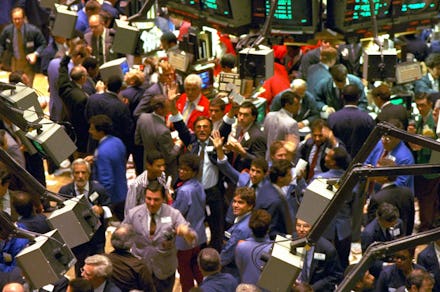Dow Jones Industrial Average: The problem with invoking Black Monday in 2017

Imagine if a fifth of your nest egg disappeared in a single day. If you’d invested your retirement saving in stocks, that’s what could have happened to you on Oct. 19, 1987, when the Dow Jones Industrial Average fell more than 22% — or 508 points — in one of the worst days in stock market history, known as Black Monday.
Thursday marked the 30th anniversary of Black Monday, and financial media coverage focused on whether a similar crash could be around the corner. In an unsettling coincidence, the Dow Jones Industrial Average also dipped Thursday morning after five days of steady gains — to a record above 23,000 points. But by Thursday’s close, the Dow had recovered and closed essentially flat — following a more-than-100-point drop in the morning — and by Friday at 2:00 p.m. Eastern, the DJIA was up more than 130 points.
MarketWatch and the Financial Times tweeted “could this happen again”-type headlines early Thursday morning, with another MarketWatch post invoking Black Monday and today’s Dow dip, after market open, in the same breath.
Technically, Black Monday is unlikely to ever be repeated as it happened, because regulators have taken steps to prevent stocks from falling so much so quickly. Starting in 2013, new rules by the Securities and Exchange Commission known as “circuit breakers” kicked in, which temporarily halt trading if stocks rise or fall too much in a single day. Circuit breakers are supposed to prevent panic selling, which is basically when people start selling all their assets for less than they’re worth in a frenzy.
But more importantly, while the market in 2017 certainly could be due for a fall, the conditions, reasons and consequences could be far different than in 1987.
That September, Nobel Prize-winning economist Robert J. Shiller’s CAPE measure — which gauges how overvalued or undervalued the market is — was at a healthy reading of about 17. Today that figure is a bloated 31.
And indeed, back in 1987, the best way to have weathered Black Monday was to do nothing. In a Black Monday essay in Thursday’s New York Times, Shiller notes that the market began rising again within a week of the drop. Those who just stuck it out did “splendidly.” Shiller pointed out that “panic selling” is probably what caused the crash in the first place — “a panic caused by fear and based on rumors, not on real danger.”
His thesis not only helped earn Shiller a Nobel Prize, but also pushed back on initial presidential commission conclusions about the crash: Similar to contemporary critics of the rise of algorithm-run retirement accounts, the commission blamed “program trading, on autopilot” for the sell-off.
But as Shiller lays out, the automatic trading blamed for the crash “was just a repackaged version of the age-old practice of selling when the market started to fall.” When Shiller surveyed 3,200 traders, he found most of them heard of the panic — and began selling — via word of mouth.
So why should you care? The very invocation of Black Monday while discussing Thursday’s Dow dip — which quickly dissipated — shows the trouble in fixating on short-term movements over the bigger picture.
We’re too quick to make decisions based on what we think are educated guesses about what the market might do next.
The story of Black Monday shows how quickly panic can spread, and how difficult it can be to hold on and wait for everything to turn fine. Yet, on the other hand, invoking the crash to discuss the market today can create the wrong expectations — giving investors a false sense of optimism if the market keeps climbing without a big single-day drop.
Still, if you’re stressed out about what will happen to your savings, remember that investors with time before retirement actually have a reason to be rooting for a stock market pullback — as an opportunity to buy into good companies at a cheaper price. Just don’t be surprised if it happens: Or, better yet, when.
October 20, 2017 2:00 p.m.: This story has been updated.
Sign up for the Payoff — your weekly crash course on how to live your best financial life.